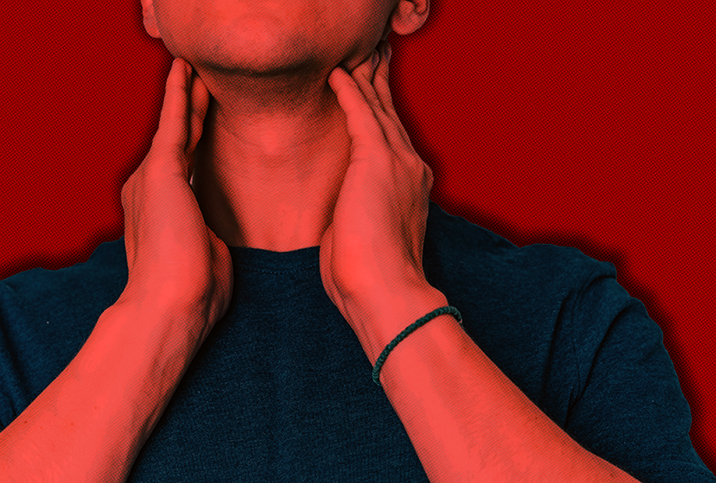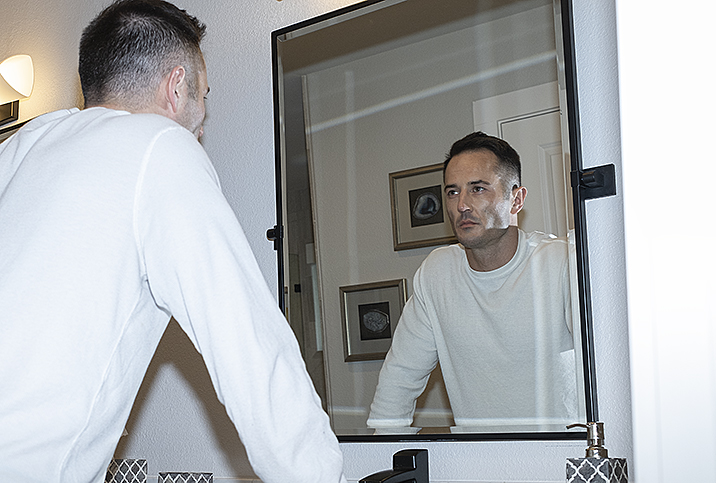What's the Thyroid Gland and Why is it Causing Erectile Issues?

Getting an erection is a complicated operation. It involves an intricate dance among a variety of body components, including the cardiovascular system, hormones, the nervous system, the brain, emotions and more. Even on a good day, erections are tricky.
As if men didn't have enough problems, it turns out that the thyroid gland, which many men have only vaguely heard of, can also have a major impact on erectile function.
What is the thyroid gland?
The thyroid is a small, butterfly-shaped gland in the neck that can have an outsized impact on your life. It produces a variety of hormones that regulate heart rate, body temperature and blood pressure.
For men, however, the list gets longer—and infinitely more annoying. Thyroid disease can cause loss of muscle mass, low sperm count and erectile dysfunction (ED).
If you're a man with thyroid disease, the odds are good you have ED. A 2008 study published in the Journal of Clinical Endocrinology & Metabolism found that about 80 percent of men with thyroid disease also had some degree of ED.
Many men might not even be aware of the potential problems the thyroid presents for them. That's because women are five to eight times more likely to be stricken by thyroid problems, so for men, the thyroid frequently goes overlooked as a potential cause of ED and other maladies.
What is thyroid disease?
There are two distinct types of thyroid disease, hyperthyroidism and hypothyroidism. Both can affect a man's sexual function, including his ability to get an erection.
Hypothyroidism
Hypothyroidism occurs when a person's thyroid gland is underactive, meaning it's not producing enough hormones.
The most common cause of hypothyroidism is called Hashimoto's disease, in which the body's immune system attacks the thyroid gland. General symptoms of hypothyroidism include fatigue, dry skin, weight gain, depression, feeling cold, joint pain and memory problems.
Hyperthyroidism
Hyperthyroidism is the overproduction of thyroid hormone. It's typified by weight loss, nervousness, fast heartbeat, sweating, increased appetite, difficulty sleeping, muscle weakness and feeling hot.
Male-specific problems from thyroid disease include:
- Balding or hair loss
- Loss of sex drive
- Decreased testosterone levels
- Gynecomastia, or enlarged breasts
- Loss of muscle mass
Thyroid disease and sexual function
A 2018 meta-study that collated and analyzed data from 40 years of research into the thyroid and sexual dysfunction found some notably consistent figures.
With hypothyroidism, 59 to 63 percent of men experienced sexual issues, including erectile dysfunction, decreased libido and delayed ejaculation.
For men with hyperthyroidism, the numbers were similar: 48 to 77 percent had the same issues.
One major takeaway from this research is that a notable number of the men experiencing sexual dysfunction along with thyroid issues were under the age of 40. Given the rise in ED among younger men in recent years, it's not inconceivable to believe there was a thyroid connection for at least some of them.
Another important factor to note is that researchers say with thyroid treatment, many of their subjects' sexual dysfunction issues also went away.
How is thyroid disease treated?
Hypothyroidism is typically treated with levothyroxine, a synthetic thyroid hormone. Some side effects while your doctor calibrates your dosage may include increased appetite, insomnia and shakiness, but none should affect sexual function, according to the Mayo Clinic.
Hyperthyroidism is usually treated with antithyroid hormone medications such as methimazole and propylthiouracil. It may also be treated with radioactive iodine, beta-blockers or surgery. As with hypothyroidism, treatments don't generally affect sexual function except to improve it.
Conclusions
Since the prevalence of thyroid dysfunction increases with age, it can be tricky identifying whether the normal effects of aging, such as hair loss, loss of energy and reduced libido, may be caused by a thyroid disorder. However, keeping thyroid disease on your radar if you experience ED or other sexual dysfunction isn't a bad idea.
Note the constellation of symptoms for each type of thyroid disorder, hyperthyroidism and hypothyroidism, and if you fit the bill, be sure to tell your doctor about it, along with any sexual dysfunction issues you're having, and get tested.


















